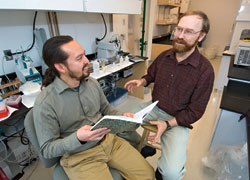 |
 Enlarge image
Enlarge image |
| Assistant Scientist Mak Saito, left, with Ken Buesseler, department chair, in the new trace metal clean lab in the Stanley W. Watson Laboratory. Mak studies trace metals in the oceans, especially their role as micronutrients for marine phytoplankton. (Photo by Tom Kleindinst, WHOI) |
| |
| Related Links |
» Marine Chemistry and Geochemistry Department
» DSV
Alvin
|
Scientists in the Marine Chemistry and Geochemistry Department
had another busy year in 2005. Staff members could be found
throughout the world’s oceans on research cruises, back
in the lab analyzing samples and working on new chemical techniques,
and using models to understand everything from small-scale
geochemical reactions to large-scale global processes. In
2005 four scientists joined the department, adding new and
complementary skills.
Marco Coolen arrived from the Royal Netherlands Institute
for Sea Research (Royal NIOZ). With his background in organic
geochemistry and microbial biology (from the University of
Oldenburg in Germany and the Royal NIOZ) he is one of the
few investigators in the world who can look back in time at
layers of marine and lake sediments and analyze ancient DNA
sequences to learn, at the species level, which microorganisms
had been living in the overlying waters at that time. Marco
is a pioneer in this challenging new field of paleomicrobiology.
Olivier Rouxel was hired after being one of our WHOI postdoctoral
scholars who was sponsored by the Deep Ocean Exploration Institute,
having obtained his Ph.D. degree at Institut National Polytechnique
de Lorraine in France and worked at the University of Cambridge
in England. His area of specialty is the application of metal
stable isotopes, which are natural chemical signatures that
change slightly depending upon the extent of chemical and
biological processing. Using special WHOI mass spectrometry
facilities managed by Lary Ball, Olivier has applied his skills
in isotope geochemistry to look at hydrothermal systems, marine
sediments, weathering of rocks, and the biology and chemistry
of the ancient oceans.
Dierdre (DeDe) Toole was also a WHOI postdoctoral scholar
sponsored by the Ocean and Climate Change Institute. She came
from the University of California, Santa Barbara, where she
studied satellite oceanography, modeling, ocean optics, and
analytical techniques to measure climate-relevant gases, in
particular one called dimethylsulfide (DMS). These combined
skills allow her to study the production by marine plankton
of DMS, which may influence both the hydrologic cycle and
the global heat budget through its role in cloud formation,
and may alter rainfall patterns and temperatures.
Laura Robinson comes to us from a postdoctoral position at
California Institute of Technology, following her Ph.D. degree
from the University of Oxford. Her studies focus on past records
of climate change, recorded in the skeletons of deep-sea corals.
Her innovative studies allow us to look at deep ocean circulation
in the past by measuring chemical signatures in corals bands,
in particular carbon isotopic records from corals that are
retrieved via deep ocean dredging or directly from research
submersibles such as Alvin.
These scientists join a diverse MC&G scientific staff
that study not just the fundamental chemical properties of
the ocean, but who use chemical signatures as tracers to learn
more about marine biology, geology, and physics, and more
broadly, how the ocean and earth work today as well as in
the past. These new scientists are a diverse group, from different
fields and different countries, trained in some of the top
labs in the world. We wish them well as they embark on fruitful
WHOI careers.
—Ken Buesseler, Department Chair
|

